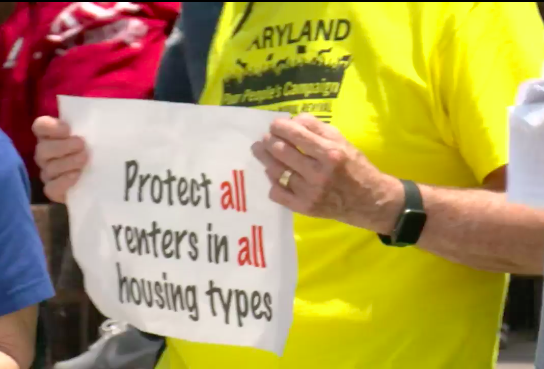
Members of the Montgomery County Council unanimously agreed on Tuesday to put more teeth into the Office of Consumer Protection’s ability to enforce landlord tenant issues.
By clarifying consumer goods and services to include rental housing, councilmembers hope to speed up the time it takes for landlords to fix a problem. They also expect to collect more fines.
During Fiscal Year 2024, fines amounting to $1.5 million were issued. But the county only collected $100,375, according to the bill’s lead sponsor, Councilmember Kristin Mink. “We are leaving a lot of money on the table.”
She added, “The hope is that this is actually going to recover the many, many unpaid fines.”
Judges often give landlords several months to fix housing code violations. Landlords, if they fix the problem, will wait until the very last moment to do the repairs, she said. Often, that deadline is extended.
The bill, which would go into effect 91 days after County Executive Marc Elrich signs it into law, removes a current exemption for landlords involving complaints by consumers.
“The bill would expand the Office of Consumer Protection’s ability to investigate and enforce landlord tenant issues that could include unfair or deceptive trade practices”, explained Councilmember Sidney Katz.
“It’s going to be another tool in the toolbox,” said Council Vice President Will Jawando, who noted that 400,000 county residents are renters.
The Consumer Protection for Renters bill includes wording that would avoid duplication of efforts between the housing and consumer affairs departments. It also includes the hiring of one or two new county employees.
This legislation was supported by numerous organizations, including Action in Montgomery (AIM), Service Workers International Union (SEIU) Local 500, United Food and Commercial Workers Local 1994 – MCGEO, the Islamic Society of the Washington Area (ISWA), the Muslim Community Center (MCC) of Silver Spring, CASA, the Enclave (Silver Spring) Tenants Association, Jews United for Justice (JUFJ) and Everyday Canvassing.
“Once this bill is signed into law, rental housing, typically tenants’ largest expense, will no longer be exempted from our County’s Consumer Protection laws,” Mink noted.
“Because of that exemption, tenants have had no meaningful recourse if they discover they’ve been sold a false bill of goods and are locked into a lease with a landlord that chronically and illegally fails to meet basic obligations. A handful of the worst actors have wasted a significant amount of County code enforcement time for years on end, as they continue pitching their buildings to prospective tenants as safe, healthy, even luxury dwellings.”
The bill would allow County officials to bring multiple cases at a time to the Montgomery County Circuit Court to illustrate patterns of deceptive practices by one landlord, rather than fighting for single citations.
“This legislation improves the County’s ability to bring landlords who repeatedly violate tenant protections in the County Code into compliance,” said Elrich in a news release.
“Unfortunately, a minority of landlords rely on delaying the fixing of housing code violations or engaging in deceptive trade practices as part of their business model. They rely on six-month-plus delays in our overburdened District Court and the practice of judges to reduce fines to negligible amounts,” he said.


Comments are closed.